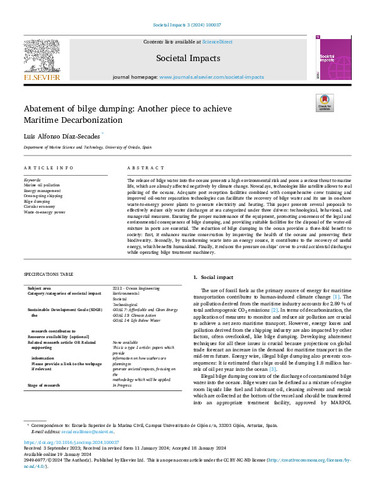Abatement of bilge dumping: another piece to achieve Maritime Decarbonization
Autor(es) y otros:
Palabra(s) clave:
Maritime decarbonization; marine pollution
Fecha de publicación:
Editorial:
Elsevier
Versión del editor:
Citación:
Resumen:
The release of bilge water into the oceans presents a high environmental risk and poses a serious threat to marine life, which are already affected negatively by climate change. Nowadays, technologies like satellite allows to real policing of the oceans. Adequate port reception facilities combined with comprehensive crew training and improved oil-water separation technologies can facilitate the recovery of bilge water and its use in on-shore waste-to-energy power plants to generate electricity and heating. This paper presents several proposals to effectively reduce oily water discharges at sea categorized under three drivers: technological, behavioral, and managerial measures. Ensuring the proper maintenance of the equipment, promoting awareness of the legal and environmental consequences of bilge dumping, and providing suitable facilities for the disposal of the water-oil mixture in ports are essential. The reduction of bilge dumping in the ocean provides a three-fold benefit to society: first, it enhances marine conservation by improving the health of the oceans and preserving their biodiversity. Secondly, by transforming waste into an energy source, it contributes to the recovery of useful energy, which benefits humankind. Finally, it reduces the pressure on ships' crews to avoid accidental discharges while operating bilge treatment machinery.
The release of bilge water into the oceans presents a high environmental risk and poses a serious threat to marine life, which are already affected negatively by climate change. Nowadays, technologies like satellite allows to real policing of the oceans. Adequate port reception facilities combined with comprehensive crew training and improved oil-water separation technologies can facilitate the recovery of bilge water and its use in on-shore waste-to-energy power plants to generate electricity and heating. This paper presents several proposals to effectively reduce oily water discharges at sea categorized under three drivers: technological, behavioral, and managerial measures. Ensuring the proper maintenance of the equipment, promoting awareness of the legal and environmental consequences of bilge dumping, and providing suitable facilities for the disposal of the water-oil mixture in ports are essential. The reduction of bilge dumping in the ocean provides a three-fold benefit to society: first, it enhances marine conservation by improving the health of the oceans and preserving their biodiversity. Secondly, by transforming waste into an energy source, it contributes to the recovery of useful energy, which benefits humankind. Finally, it reduces the pressure on ships' crews to avoid accidental discharges while operating bilge treatment machinery.
ISSN:
Colecciones
- Artículos [37532]
- Ciencia y Tecnología Náutica [29]
Ficheros en el ítem





